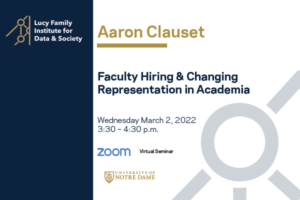
Wed Mar 2nd 3:30 pm – 4:30 pm
Join the Lucy Family Institute for Data & Society for a Virtual Seminar
with Aaron Clauset
on Faculty hiring and changing representation in academia
Register for the zoom link here
Abstract:
University faculty play a special role in the scientific ecosystem: they make new discoveries, they have long careers, and they train other future scientists. Despite the societal importance of the scientific workforce, its composition and dynamics are not well understood, and inequalities are pervasive and persistent, both at the individual and organizational levels. In this talk, I’ll begin by showing how the network of who hires whose graduates as faculty implicates a fundamental role for ‘prestige’ in structuring the entire academic system. As a result, increased institutional prestige leads to greater faculty production, better faculty placement, and a more influential position within a discipline. I’ll then show how the scientific workforce is, and has remained, accessible mainly to the socioeconomically privileged, a pattern with deep implications for both the type of scholarship it produces and the new scholars that faculty train. I’ll close with an argument that connects these two findings and offers a way that prestige driven hiring can help diversify the academy and broaden its contributions to society.
Aaron Clauset is an Associate Professor in the Department of Computer Science and the BioFrontiers Institute at the University of Colorado Boulder, and is External Faculty at the Santa Fe Institute. He received a PhD in Computer Science, with distinction, from the University of New Mexico, a BS in Physics, with honors, from Haverford College, and was an Omidyar Fellow at the prestigious Santa Fe Institute. In 2016, he was awarded the Erdos-Renyi Prize in Network Science, and since 2017, he has been a Deputy Editor responsible for the Social, Computing, and Interdisciplinary Sciences at Science Advances.
Clauset is an internationally recognized expert on network science, data science, and machine learning for complex systems. His research program is around two general themes: identifying fundamental principles of the organization and behavior of complex social and biological systems, and developing approaches for using data and computation to illuminate those ideas. A recent major focus of this work has been on the “science of science,” where he studies the shape, origins, and consequences of social and epistemic inequalities on scientific careers, productivity, the spread of ideas, and the composition of the scientific workforce. His research results have appeared in many prestigious scientific venues, including Nature, Science, PNAS, SIAM Review, Science Advances, Nature Communications, AAAI, and ICDM. His work has been covered in the popular press by Quanta Magazine, the Wall Street Journal, The Economist, Discover Magazine, Wired, the Boston Globe and The Guardian.
